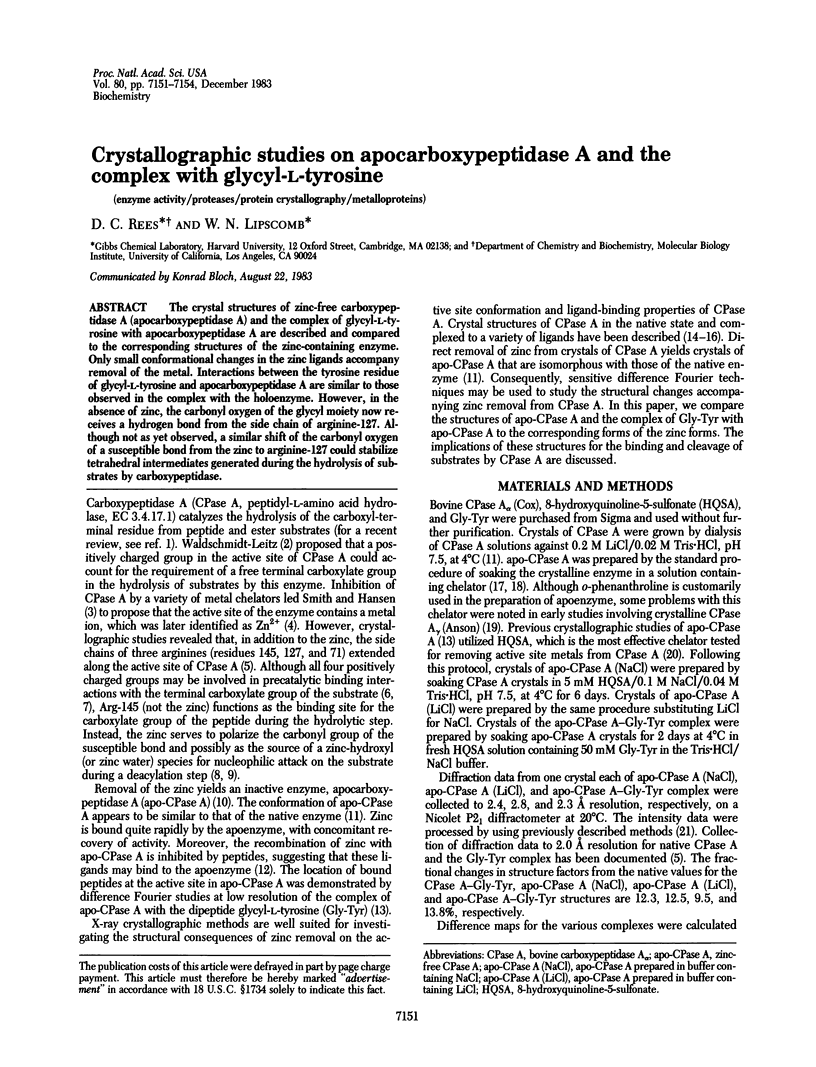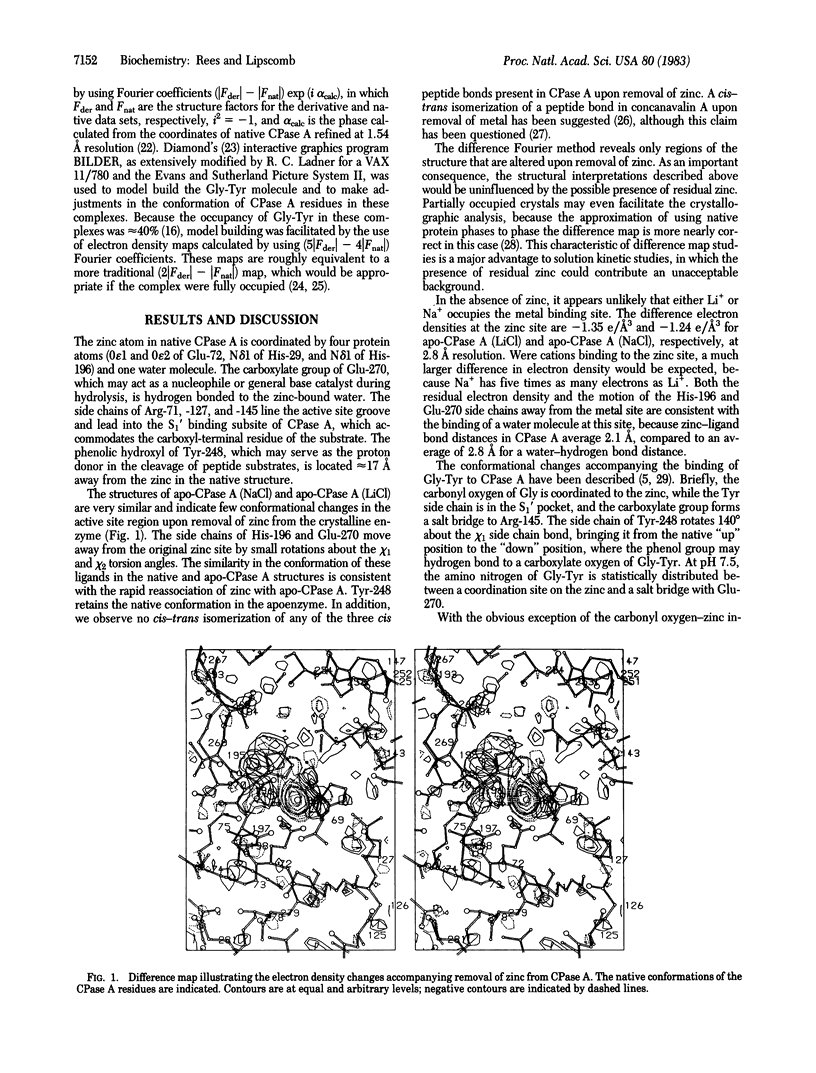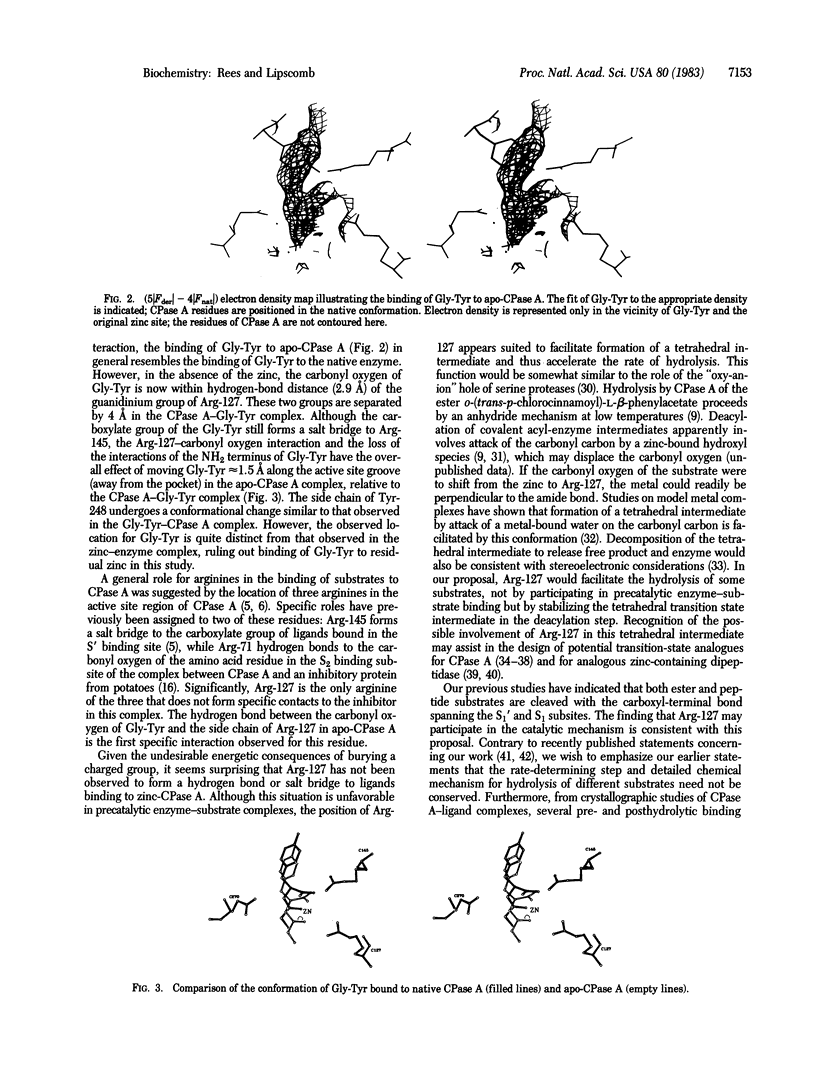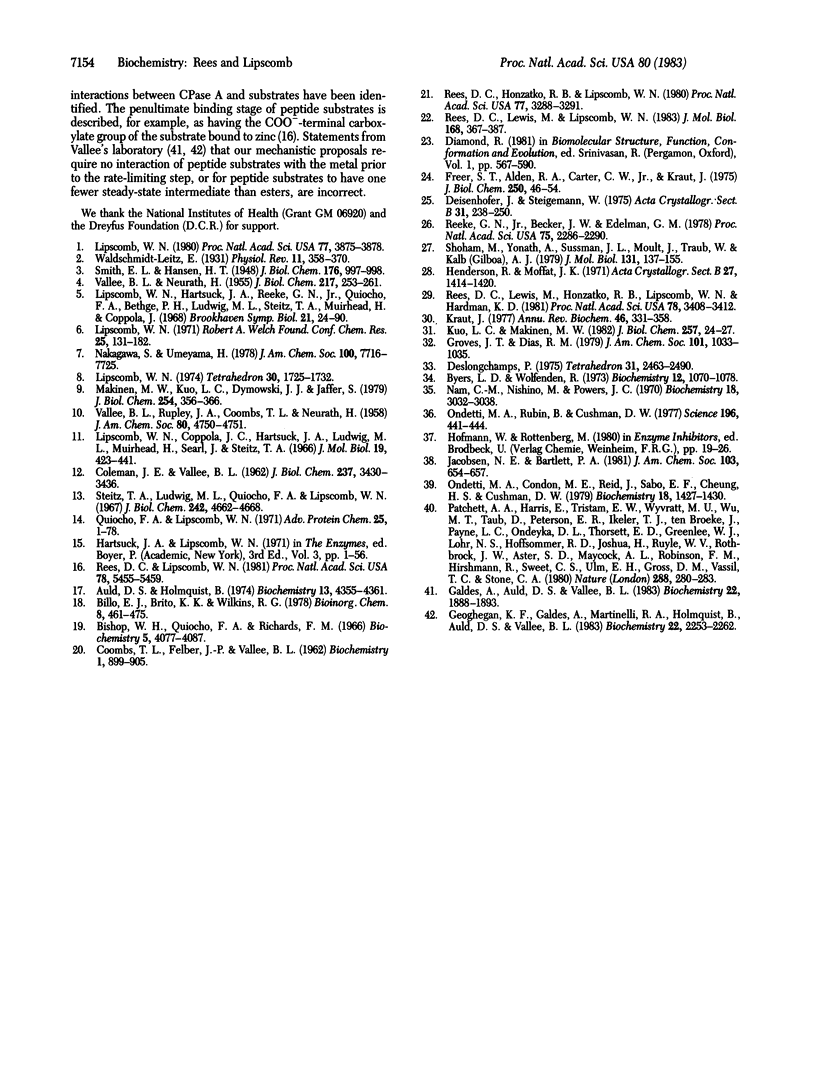Abstract
The crystal structures of zinc-free carboxypeptidase A (apocarboxypeptidase A) and the complex of glycyl-L-tyrosine with apocarboxypeptidase A are described and compared to the corresponding structures of the zinc-containing enzyme. Only small conformational changes in the zinc ligands accompany removal of the metal. Interactions between the tyrosine residue of glycyl-L-tyrosine and apocarboxypeptidase A are similar to those observed in the complex with the holoenzyme. However, in the absence of zinc, the carbonyl oxygen of the glycyl moiety now receives a hydrogen bond from the side chain of arginine-127. Although not as yet observed, a similar shift of the carbonyl oxygen of a susceptible bond from the zinc to arginine-127 could stabilize tetrahedral intermediates generated during the hydrolysis of substrates by carboxypeptidase.
Full text
PDF



Selected References
These references are in PubMed. This may not be the complete list of references from this article.
- Auld D. S., Holmquist B. Carboxypeptidase A. Differences in the mechanisms of ester and peptide hydrolysis. Biochemistry. 1974 Oct 8;13(21):4355–4361. doi: 10.1021/bi00718a018. [DOI] [PubMed] [Google Scholar]
- Billo E. J., Brito K. K., Wilkins R. G. Kinetics of formation and dissociation of metallocarboxypeptidases. Bioinorg Chem. 1978 Jun;8(6):461–475. doi: 10.1016/0006-3061(78)80001-5. [DOI] [PubMed] [Google Scholar]
- COLEMAN J. E., VALLEE B. L. Apocarboxypeptidase-substrate complexes. J Biol Chem. 1962 Nov;237:3430–3436. [PubMed] [Google Scholar]
- COOMBS T. L., FELBER J. P., VALLEE B. L. Metallocarboxpeptidases: mechanism of inhibition by chelating agents, mercaptans, and metal ions. Biochemistry. 1962 Sep;1:899–905. doi: 10.1021/bi00911a024. [DOI] [PubMed] [Google Scholar]
- Freer S. T., Alden R. A., Carter C. W., Jr, Kraut J. Crystallographic structure refinement of Chromatium high potential iron protein at two Angstroms resolution. J Biol Chem. 1975 Jan 10;250(1):46–54. [PubMed] [Google Scholar]
- Galdes A., Auld D. S., Vallee B. L. Cryokinetic studies of the intermediates in the mechanism of carboxypeptidase A. Biochemistry. 1983 Apr 12;22(8):1888–1893. doi: 10.1021/bi00277a023. [DOI] [PubMed] [Google Scholar]
- Geoghegan K. F., Galdes A., Martinelli R. A., Holmquist B., Auld D. S., Vallee B. L. Cryospectroscopy of intermediates in the mechanism of carboxypeptidase A. Biochemistry. 1983 Apr 26;22(9):2255–2262. doi: 10.1021/bi00278a031. [DOI] [PubMed] [Google Scholar]
- Kam C. M., Nishino N., Powers J. C. Inhibition of thermolysin and carboxypeptidase A by phosphoramidates. Biochemistry. 1979 Jul 10;18(14):3032–3038. doi: 10.1021/bi00581a019. [DOI] [PubMed] [Google Scholar]
- Kraut J. Serine proteases: structure and mechanism of catalysis. Annu Rev Biochem. 1977;46:331–358. doi: 10.1146/annurev.bi.46.070177.001555. [DOI] [PubMed] [Google Scholar]
- Kuo L. C., Makinen M. W. Hydrolysis of esters by carboxypeptidase A requires a penta-coordinate metal ion. J Biol Chem. 1982 Jan 10;257(1):24–27. [PubMed] [Google Scholar]
- Lipscomb W. N., Hartsuck J. A., Reeke G. N., Jr, Quiocho F. A., Bethge P. H., Ludwig M. L., Steitz T. A., Muirhead H., Coppola J. C. The structure of carboxypeptidase A. VII. The 2.0-angstrom resolution studies of the enzyme and of its complex with glycyltyrosine, and mechanistic deductions. Brookhaven Symp Biol. 1968 Jun;21(1):24–90. [PubMed] [Google Scholar]
- Makinen M. W., Kuo L. C., Dymowski J. J., Jaffer S. Catalytic role of the metal ion of carboxypeptidase A in ester hydrolysis. J Biol Chem. 1979 Jan 25;254(2):356–366. [PubMed] [Google Scholar]
- Ondetti M. A., Condon M. E., Reid J., Sabo E. F., Cheung H. S., Cushman D. W. Design of potent and specific inhibitors of carboxypeptidases A and B. Biochemistry. 1979 Apr 17;18(8):1427–1430. doi: 10.1021/bi00575a006. [DOI] [PubMed] [Google Scholar]
- Ondetti M. A., Rubin B., Cushman D. W. Design of specific inhibitors of angiotensin-converting enzyme: new class of orally active antihypertensive agents. Science. 1977 Apr 22;196(4288):441–444. doi: 10.1126/science.191908. [DOI] [PubMed] [Google Scholar]
- Patchett A. A., Harris E., Tristram E. W., Wyvratt M. J., Wu M. T., Taub D., Peterson E. R., Ikeler T. J., ten Broeke J., Payne L. G. A new class of angiotensin-converting enzyme inhibitors. Nature. 1980 Nov 20;288(5788):280–283. doi: 10.1038/288280a0. [DOI] [PubMed] [Google Scholar]
- Quiocho F. A., Lipscomb W. N. Carboxypeptidase A: a protein and an enzyme. Adv Protein Chem. 1971;25:1–78. doi: 10.1016/s0065-3233(08)60278-8. [DOI] [PubMed] [Google Scholar]
- Reeke G. N., Jr, Becker J. W., Edelman G. M. Changes in the three-dimensional structure of concanavalin A upon demetallization. Proc Natl Acad Sci U S A. 1978 May;75(5):2286–2290. doi: 10.1073/pnas.75.5.2286. [DOI] [PMC free article] [PubMed] [Google Scholar]
- Rees D. C., Honzatko R. B., Lipscomb W. N. Structure of an actively exchanging complex between carboxypeptidase A and a substrate analogue. Proc Natl Acad Sci U S A. 1980 Jun;77(6):3288–3291. doi: 10.1073/pnas.77.6.3288. [DOI] [PMC free article] [PubMed] [Google Scholar]
- Rees D. C., Lewis M., Honzatko R. B., Lipscomb W. N., Hardman K. D. Zinc environment and cis peptide bonds in carboxypeptidase A at 1.75-A resolution. Proc Natl Acad Sci U S A. 1981 Jun;78(6):3408–3412. doi: 10.1073/pnas.78.6.3408. [DOI] [PMC free article] [PubMed] [Google Scholar]
- Rees D. C., Lewis M., Lipscomb W. N. Refined crystal structure of carboxypeptidase A at 1.54 A resolution. J Mol Biol. 1983 Aug 5;168(2):367–387. doi: 10.1016/s0022-2836(83)80024-2. [DOI] [PubMed] [Google Scholar]
- Rees D. C., Lipscomb W. N. Binding of ligands to the active site of carboxypeptidase A. Proc Natl Acad Sci U S A. 1981 Sep;78(9):5455–5459. doi: 10.1073/pnas.78.9.5455. [DOI] [PMC free article] [PubMed] [Google Scholar]
- Shoham M., Yonath A., Sussman J. L., Moult J., Traub W., Kalb A. J. Crystal structure of demetallized concanavalin A: the metal-binding region. J Mol Biol. 1979 Jun 25;131(2):137–155. doi: 10.1016/0022-2836(79)90070-6. [DOI] [PubMed] [Google Scholar]
- Steitz T. A., Ludwig M. L., Quiocho F. A., Lipscomb W. N. The structure of carboxypepidase A. V. Studies of enzyme-substrate and enzyme-inhibitor complexes at 6 A resolution. J Biol Chem. 1967 Oct 25;242(20):4662–4668. [PubMed] [Google Scholar]
- VALLEE B. L., NEURATH H. Carboxypeptidase, a zinc metalloenzyme. J Biol Chem. 1955 Nov;217(1):253–261. [PubMed] [Google Scholar]


